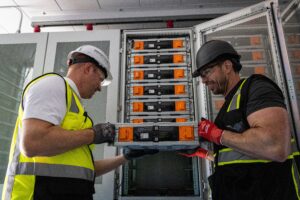Recently, there was an accident on I-15, the corridor that connects Las Vegas and Los Angeles, when a truck carrying a container filled with lithium-ion batteries overturned. It was reported that the material inside the storage container went thermal, catching fire and closing the highway for almost two days.
Hazmat road accidents in the U.S. have more than doubled over the past decade, with the majority involving combustible fuels like gasoline and diesel. Earlier this year, a tanker truck carrying gasoline burst into flames in a multi-vehicle crash on I-95 in Connecticut, shutting down the major highway for several days. While all these incidents are severe, regardless of the source, a key difference with lithium-ion batteries is the ability to recover and reuse their materials.
Enter ReMA member Redwood Materials. Headquartered in Northern Nevada, this company recycles lithium-ion batteries and manufactures sustainable battery materials — such as cathodes — to have a domestic supply of these materials to support domestic battery production.
Following the I-15 incident, Redwood worked alongside Graymar Environmental, a local expert in contaminated material cleanup, to help properly clean up the site. Redwood was able to receive the container of batteries — about 70,000 lbs., enough material to produce batteries for approximately 70 electric vehicles — and recover and recycle all of it.
Even after damage from fires or floods, Redwood can recover, on average, 95% of the metals contained in the battery and reuse them for future battery production — something that isn’t possible with fossil fuels. Redwood’s experience in end-of-life management allows the company to safely recover and recycle batteries from various sources, including those impacted from roadway incidents and natural disasters.
According to Daniel Zotos, Redwood’s senior manager of public affairs and policy, Redwood works with a wide range of partners — including battery manufacturers, automotive OEMs, automotive dismantlers, waste companies, and government agencies — to recover end-of-life lithium-ion batteries.
 End-of-life EV batteries may no longer be suitable for their original purpose, such as powering a vehicle, but can be evaluated for repurposing or recycling. Redwood can handle batteries in any condition, including those classified as damaged, defective, or recalled (DDR), ensuring sustainable recovery of valuable materials and reinforcing Redwood’s commitment to end-of-life management.
End-of-life EV batteries may no longer be suitable for their original purpose, such as powering a vehicle, but can be evaluated for repurposing or recycling. Redwood can handle batteries in any condition, including those classified as damaged, defective, or recalled (DDR), ensuring sustainable recovery of valuable materials and reinforcing Redwood’s commitment to end-of-life management.
“While we’ve responded to numerous recovery events, one early example is the work we did following the Maui wildfires in August 2023,” Zotos said. “In partnership with the Environmental Protection Agency (EPA), we mobilized to collect, transport, and manage tens of thousands of pounds of damaged lithium-ion batteries in Lahaina. These included batteries from residential storage systems, golf carts, and electric vehicles. All were safely transported to our Nevada facility, where they were recycled, and key materials such as nickel, cobalt, copper, and lithium were reintegrated into the supply chain.”
Natural disasters are occurring at unprecedented rates, with each year breaking records for fires, hurricanes, tornadoes, and floods. Climate change continues to drive the increasing intensity and frequency of recent storms like Hurricane Helene and Milton, leaving communities to grapple with the devastating aftermath. As communities embark on the process of rebuilding, Redwood anticipates a significant number of damaged EV and energy storage batteries and wants to assist first responders and ensure that battery management does not add to the challenges of recovery during this difficult time.
In these situations, Redwood deploys specially trained personnel and utilizes cutting-edge technology, often exceeding DOT requirements for packaging and transport to ensure the safest management of materials destined for recycling. By mobilizing quickly and responsibly, Redwood can maximize the sustainability of lithium-ion batteries at the end of their life while minimizing environmental impact from accidents and natural disasters.
Beyond disaster recovery, Redwood works nationwide to recover end-of-life batteries, regardless of their condition. Collaborating with dealers and dismantlers, the company identifies and recovers EV battery packs, safely packaging and transporting them for end-of-life management and recycling.
“Collaboration across the value chain is at the heart of our work with industry partners and stakeholders,” Zotos said. “Whether it’s partnering with the EPA for the Maui wildfire response or working with Graymar Environmental after the I-15 incident to recover and recycle 70,000 pounds of lithium-ion batteries, Redwood’s success depends on these cooperative efforts. We also work with automotive dismantlers daily to manage end-of-life EV batteries.”
As lithium-ion batteries become more common with the electrification of transportation and energy storage, working closely with local and national entities is critical to ensuring safety and minimizing environmental impact. Redwood regularly provides training and education to local fire departments and first responders, equipping them to handle battery-related risks with the highest safety standards.
Lithium-ion batteries present unique challenges, particularly with transportation and logistics. Identifying and safely transporting batteries — across all sizes and types — is critical.
“Our thoughts are with all those affected by Hurricanes Helene and Milton,” Zotos said. “We want communities and entities to know that Redwood is an option for recovering damaged batteries that pose a risk — whether from EVs, energy storage systems (ESS), or other lithium-ion battery applications. Our goal is to ensure that battery management does not exacerbate the challenges of recovery during such difficult times, and we remain committed to supporting safe recovery efforts.”
Photos Courtesy of Redwood Materials.










